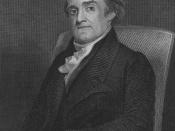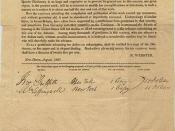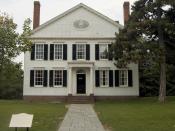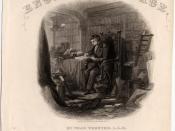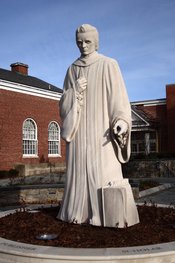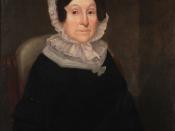Noah Webster Jr. was born on October 16, 1758 in West Hartford Connecticut in a small house that still stands at 227 South Main Street. Young Noah grew up in a society that was rapidly changing due to the Revolutionary War against Britain for America's independence. Webster's family was involved, and so was he with his many federalist essays and newspapers, in the government. Webster was educated by a minister as a young boy and by the college of Yale, where his inception of fervor for America's independence was kindled. Webster brushed shoulders with the high government officials such as Benjamin Franklin and George Washington he also made many enemies. Webster's passion was to increase education within public schooling he did this through a book that changed the face of the English language it was the dictionary, a 70,000 word book.. Noah Webster was a writer, teacher and a lawyer of these professions Webster practiced teaching more than any other he taught his own academy.
As a writer Webster wrote many essays for newspapers and his own, he also wrote books such as the Blue Back Speller to increase education in schools. Webster married Rebecca Greenleaf and had six children, four females and two males, Webster remained mostly reticence toward his private life. A description of Noah Webster's adolescence and his social surroundings, his life during and after college, writings and works he created during his life, and his influence on today's public schools.
Most children in the 18th century worked on the farms most of the year and didn't attend school the full eleven months it was offered. Farming was the main income of the families living in West Hartford, Connecticut. Noah Wenster's family also farmed but Webster believed that farming was not his career path he preferred his studies and to read over manual labor. Webster started school when he was five years old in 1764 (Cunningham 7) in a school supported by the Church (Morgan 3). After a few years he believed the school wasn't giving him an adequate education and asked his Father to pay a preacher to tutor him (Cunningham 25). Webster learned a wealth of knowledge from the Reverend and got the urge to attend college at Yale (Rollings 31) society back then always sent the eldest son to college but Webster's father agreed and so he began the college years.
As Webster grew up there was a Revolution, between the Colonies and Great Britain this influenced him greatly to push for independence of America. Webster took that fervor with him to Yale where many of his peers formed a little militia and Webster played the flute (Morgan 56). Webster's family also got involved for the effort of independence, his father was Captain of a drill squad and his older brother Abraham joined the army. The college years for Webster were full of ups and downs his freshman year went on with out to much interruption his last three years were disrupted by fortunes of war, epidemics of disease, and food shortages (Morgan 103). Despite all this he was able to complete courses in various languages, mathematics, writing, and many other general subjects (Rollings 153). Webster graduated with a Bachelor's Degree and went home where upon his father handed him an eight-dollar bill, practically worthless, and said, "take this I can do no more for you." ("Noah Webster" 27). After that Webster went up to his room to think about what to do which he did for three straight days (Morgan 79). Webster knew he would have to go out and find a job.
Webster decided to teach in public schools due to the fact that they were so insignificant to his standards. Webster received a teaching job in Glastonbury to help him pay off college debts and save enough money to study law and become a lawyer (Cunningham 92). Webster taught by rewarding not beating his students he also introduced the spelling bee to his pupils (Cunningham 94). Webster left Glastonbury and moved to Hartford where he got a job teaching in the Brick SchoolHouse, he found a job as an intern and he studied any law book he could put his hands on. When Webster and twenty-five other individuals took the bar test to become lawyers they all failed, people believe they failed due to the fact that the profession was over crowded (Morgan 59). Webster eventually passed the bar exam but did not practice law right away. Webster moved to Sharon where he opened his own academy, many of the city's elite children attended. Webster met a young lady by the name of Juliana Smith, whose father John Cotton Smith was the governor of Connecticut, he fell in love with her but she was torn between Webster and an Army Captain she knew before. The matter had to go in front of a church board in which they favored the Army Captain (Morgan 134). After the decision Webster suddenly closed down his academy and moved away.
Webster went to Goshen, New York with an idea for a spelling book that would change the way children would learn, it also established copyright laws, and changed the English language (Morgan 145). Webster also taught at Goshen and worked on his book in all his free time his boon also served as a patriotic symbol (Morgan 150). In August 1782 he was able to get his book published, his first edition didn't do as good as his new revised versions that came out later. Webster pushed for copyrights on books and their authors. Webster became an advocate for American independence he did this through many essays he wrote and by newspapers he wrote and owned.
Webster tried to reopen his academy in Sharon, New York but it failed. Webster met a young lady by the name of Rebecca Greenleaf he was fond of her from the beginning. Later on he wanted to marry her but Rebecca's family wanted to see Webster more finical secure so Webster worked and borrowed money until he won the approval of her parents (Morgan 213). Webster had a recognizable family tree, on his maternal side his great, great grandfather was William Bradford governor of the Plymouth Colony, on his paternal side his great, great grandfather was John Webster, chosen governor of Connecticut Colony, and now it was Webster's turn to start a family. Webster had a total of four children four females and two males (Rollings 152).
As a patriot Webster got to meet many highly recognizable people such as George Washington and Benjamin Franklin. He printed a federalist's paper that won him many readers and supporters but also some enemies such as Thomas Jefferson and Aaron Burr. Webster worked on his one work he wanted to finish and publish it before he died and that was the dictionary a book that would change society forever. Webster's dictionary had definitions to over seventy thousand words he got it published after twenty four years of working on it by hand (Cunningham 209) he was seventy. Webster's influence can still be seen today his dictionary has been the bases for our English language and his dictionary can be found in all public schools and libraries.
